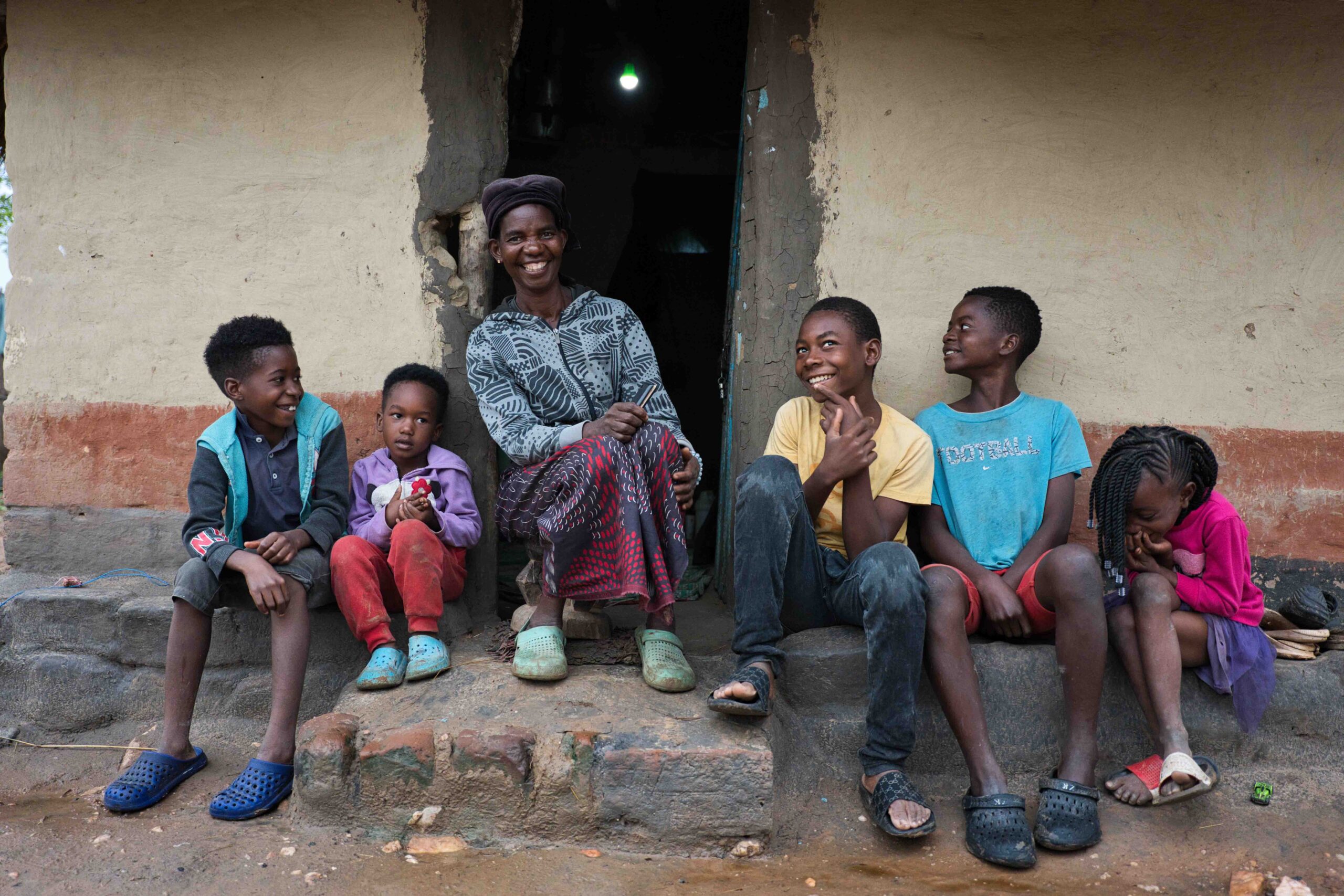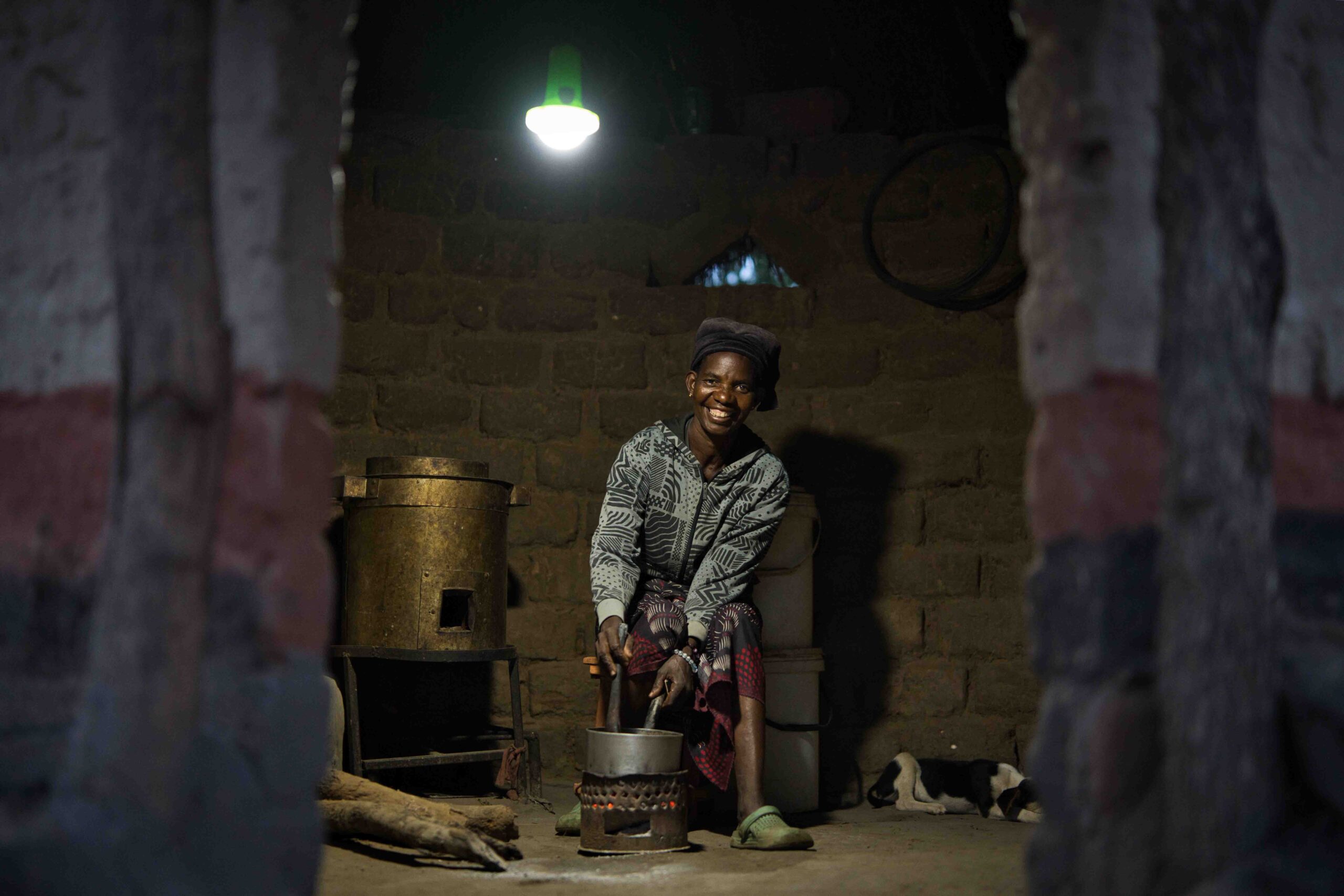Tucked beside Kasemba Mountain in Rufunsa district, about 78 kilometres from Zambia’s capital city Lusaka, lies Chimunthu village. The road winds through thick bushes, opening onto a peaceful compound with three small structures. Birds sing as the sun sets, and there, we meet 58-year-old Senzeni Chimunthu.

Customer Senzeni Chimunthu in her garden in Chimuthu village, Rufunsa, Zambia. Photo: SolarAid/Jason J Mulikita
“I am a farmer, mostly growing maize,” she says with a soft spoken voice. “This year I have decided to try growing sunflowers.”
Senzeni is a widow, living with her granddaughter Happy and her last-born son. The rest of her children—seven in total—are now adults, some with families of their own. One son, born in 2003, is currently studying at Ambassador International University.
“I have lived here for many years so I can’t recall the exact number of years,” she says. “I recall that my other son who was born in 2003 and is currently doing his studies at Ambassador International University, was born here.”

Senzeni Chimunthu, together with her grandchildren at their home in Chimuthu village, Rufunsa, Zambia
When asked what she likes most about her area, Senzeni says, “Well, I just like the area because it’s peaceful and I can’t go anywhere else as I am a widow. So, this is the place I have to support myself as I cannot move elsewhere to start afresh.”
Farming is at the heart of life in Chimunthu, but changing weather patterns are taking their toll.
“In the past, we would harvest more maize than now. With this drought we recently experienced, it’s been a challenge to have enough food and produce to sell in order to have some income at the end of the crop marketing season.”
Her days are simple and hard-working. “I usually spend my time at the farm, especially during this season. Since I just do farming, I always have the worry of looking for what to eat with my grandchildren.”
When Senzeni first bought a small solar light from Solar Entrepreneur Smart Mtonga in 2019, it marked a turning point in her daily life.

Senzeni Chimunthu prepares a meal in her kitchen, illuminated by the solar light installed at her home in Chimunthu village, Rufunsa, Zambia. The reliable lighting has transformed her cooking experience, providing a safe and sustainable solution after dark. Photo: SolarAid/Jason J Mulikita.
“Before I had a solar light, I was living in fear of snakes creeping in the house especially at night,” she explains. “I would actually avoid sleeping in my bedroom structure with firewood left just like that. This is because it was very small and for fear that it could burn down, so we would come to sleep in the kitchen area which is a bit more open and with some space to accommodate firewood for lighting at night.”
The memory of her first night with solar light remains vivid. “Yes, when I first bought a solar light from Smart in 2019, there was a big difference I noticed as compared to before.
“Having a solar light for the first time and especially this big one was a surreal feeling! I was able to see clearly at night, used the light to see my cooking at night and also slept in the bedroom which I would avoid in the past.
“Previously, we would use candles and in the absence of candles, we would only light up firewood or just depend on the light coming from the brazier.”

Senzeni Chimunthu confidently walks outside her home in Chimunthu village, Rufunsa, Zambia, guided by the bright glow of her solar light. With reliable, sustainable lighting, she can move safely through the darkness, enhancing both her security and independence. Photo: SolarAid/Jason J Mulikita
In June of last year, Senzeni received a small solar home system, a Green Lantern, as a gift. The impact of this generosity continues to shine through her daily life—and through her gratitude. But Senzeni knows that many in her community still live without reliable light.
“Not many of my neighbours have a decent solar light due to lack of money to purchase one as most of us here either don’t have or lack a sustainable source of income. So, most use those torches whose battery you need to replace and buy regularly. It takes some time for most to get new batteries and be able to use it again.”
She explains that most families rely on farming for income, and when drought hits, that income disappears. “If it’s having a solar light, most of us can only afford to buy the smaller ones and can’t afford the bigger home systems.”
Despite the challenges, her hopes remains “I hope for a better future and bright future for my children and my grandchildren. I hope and pray that they should not suffer and will live better than I have lived.”
And with the warm glow of solar light now lighting her evenings, that brighter future feels a little closer.
